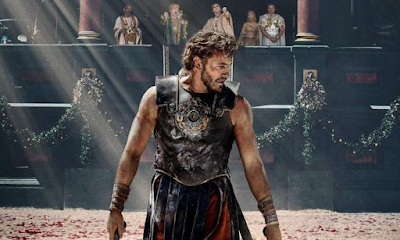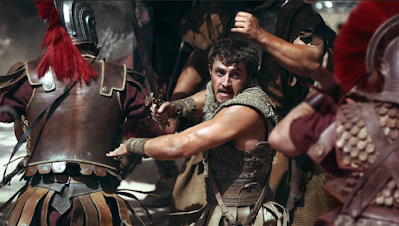After his home is conquered by the tyrannical emperors who now lead Rome, Lucius is forced to enter the Colosseum and must look to his past to find strength to return the glory of Rome to its people.
Ridley Scott’s much-anticipated return to the Roman Empire with Gladiator II arrives with an all-star cast, stunning visuals, and epic battles. However, it struggles to step out of the shadow of its iconic predecessor, delivering a visually spectacular but emotionally shallow experience. While it boasts moments of intense excitement, particularly in its immersive battle scenes, the film leans too heavily on echoes of the original, falling short of the narrative depth and character complexity that made Gladiator a classic.
Set 16 years after the death of Marcus Aurelius, Gladiator II follows Hanno (Paul Mescal), a former soldier-turned-slave seeking vengeance for the murder of his wife, Arishat. The story unfolds under the rule of the corrupt twin emperors Geta (Joseph Quinn) and Caracalla (Fred Hechinger), whose grotesque presence and eerie fascination with monkeys teeter on the edge of absurdity. Their venereal disease-ravaged appearance might have been intended as a metaphor for the decay of Rome, but it comes across as more comical than menacing.
Pedro Pascal’s Acacius, a conflicted general returning home with new gladiator slaves, and Denzel Washington’s Macrinus, a former slave turned power-hungry gladiator mentor, add layers of intrigue. Yet despite the potential for compelling subplots, the script struggles to weave them into a cohesive and impactful narrative. Instead, Gladiator II feels like a loose remake, recycling key beats from the original: a betrayal, the fall of a noble hero into slavery, and a climactic showdown in the arena. These parallels invite comparisons that highlight the sequel’s lack of originality.
Paul Mescal as Hanno is an adequate but underwhelming lead. Physically, he fits the role, but his performance lacks the emotional intensity and gravitas needed to carry the film. His anger feels one-dimensional, and his delivery of pivotal lines falls flat. Unlike Russell Crowe’s Maximus, who captivated audiences with quiet conviction and explosive fury, Mescal struggles to make Hanno’s journey resonate.
Denzel Washington, on the other hand, delivers a masterful performance as Macrinus, effortlessly stealing every scene he’s in. His character, a charming yet treacherous mentor, provides much-needed dynamism, adding depth and charisma to an otherwise straightforward revenge plot. Pedro Pascal’s Acacius brings conflicted gravitas, but his role is underdeveloped, leaving a sense of missed potential. Both actors shine in their limited screen time, but their characters deserve more exploration to elevate the story.
Where Gladiator II excels is in its battle sequences. Ridley Scott’s expertise in staging grandiose, visceral action is on full display. The gladiatorial fights are bloody, thrilling, and masterfully choreographed, immersing viewers in the brutal spectacle of ancient Rome. From the clang of swords to the roar of the crowd, these scenes capture the raw intensity that fans of the original will appreciate.
However, the film stumbles with its overreliance on CGI. While improved cinematography sharpens the visuals, the computer-generated effects detract from the authenticity that defined Gladiator. The introduction of monkeys in the arena and a rhino ridden like a rodeo bull stretches believability. The climax, featuring sharks in a flooded Colosseum, borders on the absurd, drawing giggles instead of gasps. These exaggerated sequences may aim for heightened spectacle but ultimately undermine the film’s credibility.
Despite its rousing spectacle, Gladiator II lacks the emotional weight of its predecessor. The first film grounded its epic battles with moments of quiet reflection and personal loss, creating a poignant connection between the audience and Maximus. In contrast, Hanno’s journey feels hollow, with little depth given to his motivations or relationships.
The screenplay struggles to balance its sprawling narrative, leaving promising storylines underdeveloped. Macrinus’ ambition, Acacius’ internal conflict, and the twin emperors’ political machinations are all intriguing threads that fail to fully materialize. The result is a film that entertains in the moment but lacks lasting impact.
Ridley Scott remains a master of visual storytelling, and Gladiator II showcases his ability to create immersive worlds. The production design is meticulous, bringing ancient Rome to life with grandeur and detail. From the dusty arenas to the opulent palaces, every frame is a visual feast. The score, while evocative, occasionally leans too heavily on motifs from the original, further reinforcing the sequel’s derivative nature.
Scott’s thematic exploration of power, greed, and human cruelty remains compelling. Yet, the emotional shallowness of the film undercuts its potential to deliver the same philosophical resonance as its predecessor. The heightened spectacle draws attention to the film’s inability to capture the visceral fear and humanity that made Gladiator unforgettable.
Gladiator II is a film of contrasts—spectacular yet shallow, thrilling yet forgettable. It offers enough craftsmanship and action to satisfy fans of epic cinema, but it never escapes the long shadow of its predecessor. The recycled narrative beats, underdeveloped characters, and reliance on exaggerated CGI prevent it from reaching the heights of Gladiator. While Denzel Washington and Pedro Pascal bring charisma and complexity, their roles needed more depth to elevate the story. Paul Mescal, burdened by a lacklustre script, delivers a performance that pales in comparison to Russell Crowe’s iconic turn as Maximus.
For those unfamiliar with the original, Gladiator II may provide a rousing spectacle. But for fans of Ridley Scott’s 2000 masterpiece, it’s a reminder of the power of storytelling—a lesson this sequel struggles to fully embrace.
Gladiator II was released in NZ cinemas on November 14, 2024






